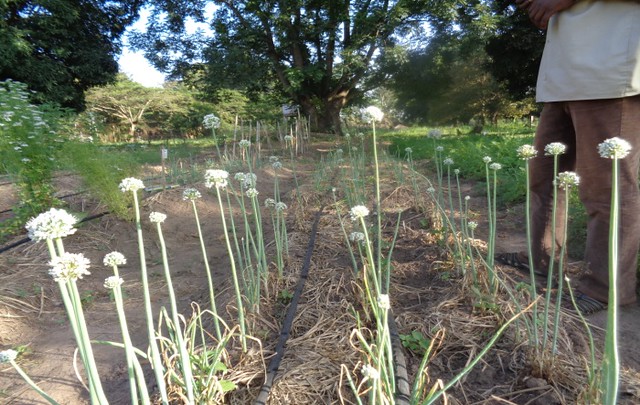
“One of the richest agricultural areas in Africa, South Sudan’s fertile soils and abundant water supplies provide great opportunities for agricultural businesses in SPARK’s ABC programme”
The Business Support Center in Yei, South Sudan, started in February 2014 after support from SPARK’s ABC program. It includes an incubation hub for entrepreneurs with a demonstration farm. Here agricultural entrepreneurs can come to test their products before marketing them in order to supply a growing consumer need. A variety of agricultural entrepreneurs come here in order to diversify their income including Moses who has been working at the hub to develop his own Bio-pesticide and Bio-gas as well as liquid fertilizers, all under organic production.
The business centre runs regular Business Plan Competitions (BPCs) to promote entrepreneurship and support business ideas in South Sudan. Moses won the BCP for his organic insect pest repellants which he tested and developed at the demonstration farm. The demo farm is also currently being used to transfer these technologies to government agricultural extension workers in the two counties of Yei and Morobo via the South Sudan Agriculture department.
“The demo is accessed by the wider community ranging from Government Agricultural Extension agents to Model farmers. We are constantly introducing new technologies at the Farm, from which they could learn. Hence the Farm is a center of technology transfer. Currently we have introduced equipment leasing” (William Butti)
Promotion of bio-pesticides and bio-fertilizer as Integrated Pesticide Management (IPM) tools in South Sudan. The hub uses a two track approach to both produce and test products while examining constraints and administration methodologies. It also conducts effectiveness studies and assessment of yields.
Indigenous vegetable and crop seeds perform well however, due to the influx of superior quality hybrid seeds, the farming communities have lost track of the indigenous seed crops for both cereals and vegetables which are actually better suited to the agro-ecological zone. Coupled with the numerous challenges of pest and disease management, the suitable seeds of this agro-ecological zone need to be preserved and the farmers offered better seed saving options for the future.
The use of bio-fertilizers to reduce the costs of expensive fertilizer matches the increasing focus on locally available renewable resources in Yemen. Increasing crop yields and using affordable inputs to provide greater resilience to the farming systems in times of extreme climate changes like drought and heavy rains are other priorities for the countries agri-business.
The strategy of establishing beneficial and natural enemy banks and resilient perimeters like trap crops, companion crops and buffer hedge rows ensures the farm maintains an ecological balance in insect population and interaction for pollination and pest population reduction.
Production to date from the demonstration farm has included approximately 120kgs of compost manure which can be applied to 7 soil conditioner beds planted; sixty liters of liquid manure has been produced and is being used on weekly basis and 40 liters of leaf manure has been produced and used at intervals of 14 days resulting in a marked improvement in plant health and vigor.
Bio-pesticides have been trialed and classified to increase production. The following basic raw material have been collected and carefully processed for use in the demonstration farm: Wettable powder (dried pesticide for convenience of storage and transportation); Liquid based formulations 20L (broad spectrum) and Moses’s own “Trust Me” pesticide which contains lantana camara, neem, pawpaw leaves, nerium, chilli, cow urine, cow dung, garlic and jatropha curcas.
This includes pest and disease surveillance; Identification, classification and host plant studies; Infestation levels and pest behaviors; plant reactions to infections; habitat and niche conditions for infestations; plant variety growth stages at infestation; Implementation of IPM and Integrated Crop Management (ICM) tools like field sanitation and the use of baits and cultural field management.
The promotion of organic farming system with implementation of IPM tools has been proven to work well in reducing the economic injuries from pests and diseases which farmers experience while also producing healthier plant yields during harvest.
The Incubation hub has further helped to establish new management practices by identifying
the basic raw materials needed for the production of bio-pesticides. The economic threshold of a pest/disease infection has also been analysed to show the injury levels to the farmer. Sustainable farming design has been proven as a solution to South Sudan’s farming resource poverty and farmers can now use the incubation hub as a site to learn these new skills to manage their production better.
Going forward the hub would like to develop and disseminate appropriate management options to farmers in South Sudan through field based training to give farmers the skill, knowledge and confidence to make ecologically sound and cost effective decisions on crop health. The hub would also like to develop inter-institutional collaboration between researchers and NGOs in order to build a bridge between key players and better support farmers ready to experiment with IPM tools. It would also like to increase participatory assessments of IPM/ICM tools to increase enhance the ecological principles learnt from annual crops and transfer these to perennial crops.
Currently the hub lacks equipment and facility to do Isolation the individual constituents of active ingredients, minerals and use of adjuvants. It further lacks the appropriate packaging and containers for the products which has a high bearing on the efficacies of the products.
The Incubation Hub would has spotlighted several areas for further enterprise including; establishing insectaries and increasing the use of its the facilities; an technical advisory service on production and utilization; producing of plant protectants like Spinosa and Trachoderma; setting up a foundation for organic product export to international markets.